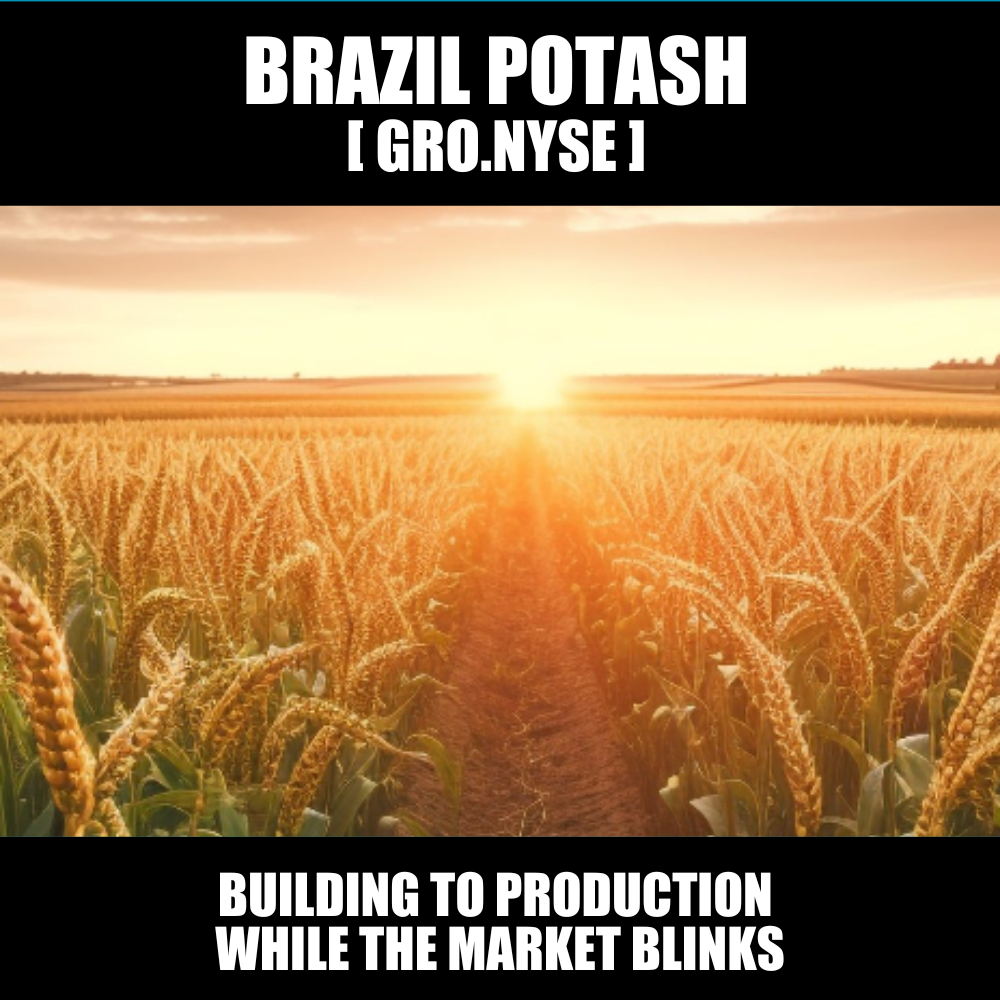
Disclaimer: This article has been paid for by Brazil Potash. See disclosures at the bottom of the page.
There’s a funny thing happening with Brazil Potash (NYSE-A GRO).
Not funny ‘ha-ha’ as much as ‘funny weird.’
The company’s flagship Autazes project with the potential to produce around 2.4 million tonnes of potash per year and replace about a quarter of Brazil’s massive fertilizer import reliance—is quietly ticking off milestones. Site work is progressing. Permits are being landed. Capital is being secured. And yet, the market seems not to care.
GRO debuted on the NYSE American at $15 late last year. It now trades closer to $1.30.
Nobody is happy with that, but there’s been no collapse in commodity pricing, no scandal, no public missteps. Just what appears to be a complete disconnect between long-term fundamentals and short-term sentiment.
So what’s really going on?
Macro Moves, Local Opportunity
Brazil imports over 95% of its potash—a vulnerability exposed when the Russia-Belarus supply chain fractured after the Ukraine conflict began and one exasperated by the war the middle east. These geopolitical events haven’t been resolved. In fact, Brazil’s government continues to push hard for fertilizer independence, and Brazil Potash’s Autazes Project is the most advanced project on deck to answer that call.
There’s political support, regulatory tailwind, and an end-market in desperate need of domestic supply. And in the background, global population growth continues driving agricultural demand.
Potash is not some tech-fad fertilizer. It’s foundational. And Brazil Potash is playing a long game in the right sandbox.
Project Milestones Continue
In April 2025, Brazil Potash announced it had signed a key fauna rescue contract—one of the final environmental steps before construction ramps up. That important step means Brazil Potash is utilizing a local company, Ecology Suporte Ambiental e Enghenharia (translated: Ecology Environmental Support and Engineering), to relocate local wildlife that may come in contact with the facility as it progresses, in accordance with local environmental rules and regulations.
To wit: “The agreement covers comprehensive fauna management activities required prior to vegetation modification in designated project areas, in full compliance with environmental authorizations granted by the Amazonas Environmental Protection Institute (IPAAM). Specialized teams will identify, collect, and safely relocate native wildlife to suitable habitats, ensuring biodiversity conservation throughout the construction process.”
The team also entered into an agreement for up to $75 million in standby equity line of credit (ELOC) financing, ensuring runway for ongoing project advancement.
The detail: “Under the terms of the agreement, Brazil Potash has the right to sell, and Alumni has the obligation to purchase, up to $75 million worth of common shares over a 24-month period at prices that are based on the market price at the time of each sale to Alumni, subject to the satisfaction of certain customary conditions and liquidity thresholds. Brazil Potash, at its sole discretion, controls the timing and amount of all sales of common shares associated with the ELOC, subject to the limitations contained in the any market purchase agreement.”
Management is confident.
The sell-off, by their read, is put down to market noise.
Risk vs Reward
For risk-tolerant investors, the current market cap may represent an unusually steep discount to the potential upside of a fully built Autazes Project, with the potential to crank out potash to the largest importing country (22% of market share) and, potentially, beyond. That upside isn’t theoretical: the company has had preliminary discussions with potential interest from anchor equity investors, credit facilities, and off-take agreements that could help the company reach commercial production.
The usual risk on a project the size of this one is, that the company may stumble in being able to find partners large enough to get to the ‘final build’ level – be that in financing the project build, or finding somewhere to sell the finished product. GRO has taken the first steps on these fronts, particularly given recent announcements on offtake partners.
The problem appears to be in the short term, as the market’s eye catches shiny things elsewhere while GRO builds in the background.
Bottom Line
The market is distracted. Brazil Potash isn’t. The work continues. The permitting continues. And for investors willing to weather volatility in exchange for exposure to a critical-supply, Brazil-aligned, inflation-hedged asset—GRO might be worth a fresh look – right now.
— Chris Parry
FULL DISCLOSURE: Equity.Guru/Parry Research has an agreement with Brazil Potash and may purchase stock in the company. EG/PR does not make buy/sell recommendations but you should consider any coverage in which we show the Equity.Guru client company badge as being potentially conflicted, and any investment you make in a public company as having inherent risk. This content was approved by the company before publishing.
ISSUER-PAID ADVERTISEMENT. BRAZIL POTASH CORP., or the “Company,” has or will pay Equity.Guru/Parry Resarch (“Publisher”) in cash $4,000 for marketing services, including advertisements. This advertisement is part of those issuer-paid marketing services. This compensation should be viewed as a major conflict with Publisher’s ability to be unbiased.
FORWARD LOOKING STATEMENTS. This publication contains forward-looking statements, including statements regarding expected continual growth of the featured company and/or industry. The Publisher notes that statements contained herein that look forward in time, which include everything other than historical information, involve risks and uncertainties that may affect the companies’ actual results of operations. Factors that could cause actual results to differ include, but are not limited to, government regulations concerning potash production, the size and growth of the market for potash, the companies’ ability to fund its capital requirements in the near term and long term, pricing pressures, etc.


Leave a Reply